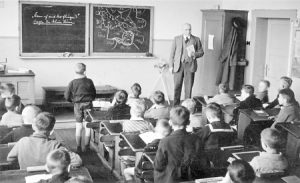We thought for a moment of trying to get to the Russian lines, but quickly dismissed the idea. Very few of the Russians we had met seemed to be aware that we were on the same side as them, and we felt that the west was the best direction to take.
We were once more pushed into cattle trucks, and this time travelled for many hours westwards. To our amazement we found ourselves briefly back at the camp from where we had escaped, but our stay was brief. We were quickly sent out to Arbeit Kommandos (work units). Our camp, near to the town of Algermissen, had accommodation for about forty men, and was a single hut by the side of a canal. The sentries and Camp Commandant, who became known to us as Happy Henry because of his very mournful features, occupied a smaller hut outside the wire. I had picked up a fair amount of German since arriving in the country and, to my surprise, because of this, I was elected Camp Leader and consequently had to deal with Happy Henry.
Being leader didn’t excuse me from work, which consisted of digging clay and repairing railway embankments at a site about four miles away. It was now the autumn of 1944 and we could sense that the Germans were becoming more uneasy with the progress of the war. Whilst out at work we were not prevented from picking up leaflets dropped by our planes – something that would have been strictly forbidden a few months before.
I have to record that it was during this period of my P.O.W. life that I encountered real kindness from those who were forced to employ us as slave labourers. Our foreman was called Willi Krochinsky, and he did his best to make life less uncomfortable for us. He even had his wife make a large cake, which he smuggled in to our compound. This was a courageous gesture, as he would have been punished severely had he been discovered. Our supervisor whilst actually working was an old man called Heinrich Rofke. He himself had been a P.O.W. in the 1914-18 war and he had some sympathy for us. He often turned a blind eye if we rested for a while to have a smoke, and he once allowed us to gather potatoes left behind after a farmer had ploughed up his field.
He said to me, “Some day you will be able to tell your grandchildren about this”. I did not believe at the time that there was much chance of this happening, but as I write this page I must pay tribute to his foresight. Happy Henry was a Sergeant in a German Infantry Regiment and he had been a village schoolmaster before the war. One day he summoned me to his hut and told me that I would not be going to work that day, but accompanying him to the local school instead. He invited me to give a geography lesson with Britain as the subject to the class of 9-10 year olds. My German was just about up to explaining the simple structure of the British Isles. Naturally I made the most of the occasion by explaining that no one had successfully invaded Britain for almost nine hundred years, and that we still had a large and supportive empire.

One night a plane returning from a bombing raid further to the east crashed in flames about a mile from our camp. We learned from Happy Henry that the crew of five men had all been killed and that their remains had been put in a grave outside the cemetery wall. I asked if we could, at least, mark the grave with a simple wooden cross. After some debate Happy Henry agreed. One of our number who was a professional joiner made a quite beautiful cross and inscribed on it the words, “Per Ardua Ad Astra”, and, “Five unknown Airmen”. I was given permission to go the next day with one other man – and, of course, a sentry – to the cemetery to place the cross on the grave, which was behind the rear wall. But before this, the strangest event happened. We had to keep the cross overnight in our hut, and the joiner who had been given the day off to make it placed it on the bunk of one of his friends as a joke. This man came in from work at dusk and went to his bunk. As he saw the cross he went very pale and staggered to a bench nearby. He would not eat his evening meal of soup and black bread, and eventually lay down on his bunk without saying a word. His condition grew worse overnight, and the following morning he was taken by the Germans to a hospital. Within two days the news came to us that he had died, and had been buried in Algermissen. We had no means of confirming this, and to this day his death remains a mystery. All I can recall at this great distance from this strange happening is that he was a corporal and a Londoner.